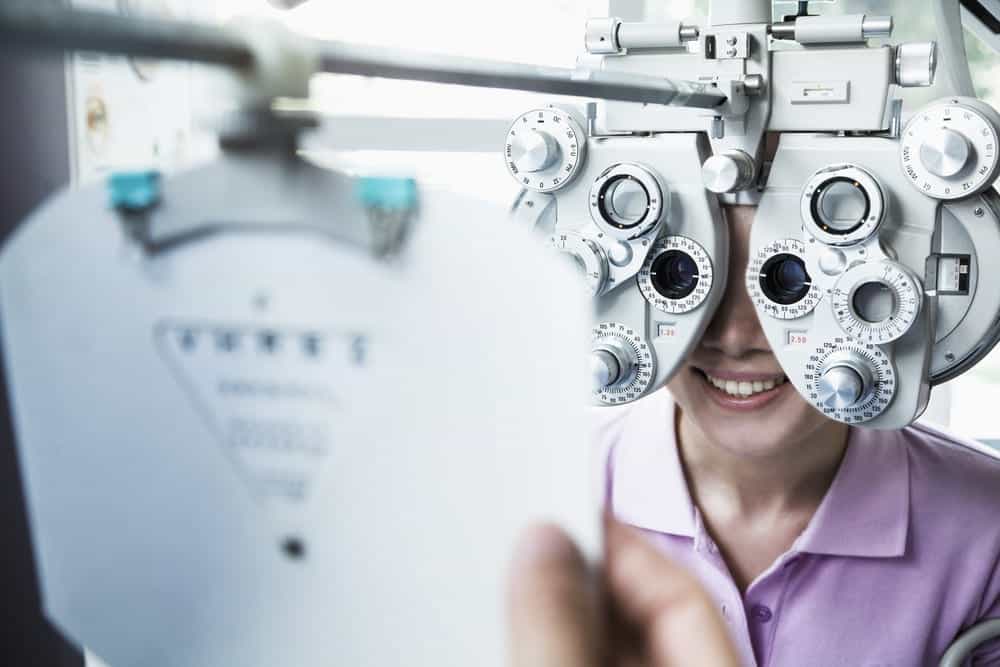An eye exam should be a critical component of your health care routine. Not only can optometrists check to see if your vision is blurry and provide a prescription for contacts or glasses, but also they can assess the condition of your eyes by conducting a variety of tests. The whole process is quick, easy, comfortable, and informative. So how often should you get your eyes checked? The answer to that question depends on a variety of factors, including your age, your vision, and your eye health.
How Often Should You Get Your Eyes Checked?
A comprehensive eye exam isn’t just a simple vision check. It involves a series of examinations to assess the health of your eyes, including some or all of the following:
- Visual acuity
- Retinal examination
- Pupil function
- Eye focus/eye teaming
- External examination of the eyes
- Intraocular pressure (IOP)
- Refraction (objective and/or subjective)
- Ocular motility
- Slit-lamp exam
- Color vision
- Keratometry
- Special exams as advised by a physician (retinal tomography, corneal topography, electroretinography, etc.)
For this reason, we don’t recommend that you only schedule an eye exam whenever your eyesight seems a little blurry. Instead, we encourage you to follow the guidelines established by the American Optometric Association (AOA), which are outlined below.
Guidelines for Children
Are you a parent? Use the guidelines below to schedule regular eye exams for your children.
[table id=1 /]
Children’s eyes grow and change throughout their childhood and teenage years, so it’s important that they’re checked regularly. “At-risk” children include those born prematurely, with a low birth weight, with low oxygen levels, or with an intraventricular hemorrhage (IVH). Children with a family history of eye-related conditions, such as congenital cataracts or retinoblastoma, are also at risk. Finally, children born to a mother with a known infection during pregnancy (rubella, herpes, venereal disease, HIV, etc.) may require earlier and more frequent eye exams as well.
Guidelines for Adults
Use the table below if you’re wondering, “How often should you get your eyes checked as an adult?”
[table id=2 /]
In these guidelines, “at-risk” individuals include those suffering from abnormally high blood pressure (hypertension) or diabetes and those with a history of eye disease, such as glaucoma. You may also be occurred a “high risk” due to your occupation, any prescription/non-prescription drugs you take with ocular side effects, or any prior eye surgery. Finally, if you wear contact lenses, you will need to schedule more frequent eye exams.
_____
As you can see, it can be tricky to quickly answer the question, “How often should you get your eyes checked?” It depends on your age, your eye health, your family medical history, and more. For personalized advice, please consult your doctor or optometrist.
Has it been a while since your last eye exam? As a quick refresher, when you visit your optometrist, you’re encouraged to bring along the following:
- A list of the prescription and non-prescription drugs you currently take, as well as the dosages
- Your eyeglasses and most recent contact lens prescription (if applicable)
- Your vision insurance and/or health insurance card (if applicable)
- A list of questions or concerns you wish to discuss
In addition, if you wear or plan to wear contacts, be sure to mention this when you make your appointment so that your optometrist can include a contact lens fitting in your eye exam.
Looking for a new optometrist? If you live near southwest Missouri, stop by Heffington’s. Since 1975, the Heffington family has been assisting the Springfield community with top-quality eye care and affordable eyeglasses and contacts. To learn more about our products and services, please get in touch with us online, send an e-mail to asktheexperts@heffingtons.com, or give us a call at 417-869-3937 (Optiland location) or 417-882-3937 (House of Vision location).

